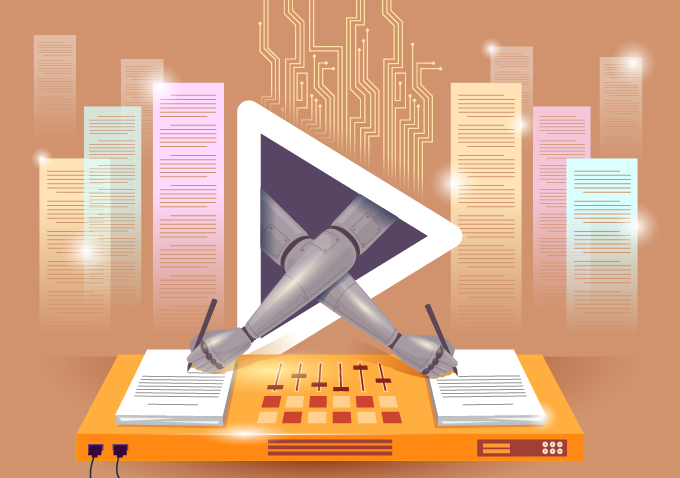

Writing with Generative AI: Remixing words like beats

Written by Simon Kearney | Graphics by Yusak Prahadi
Writing is rewriting, or so the adage goes. I’m starting to think that writing in the age of generative AI will be remixing as much as rewriting, in the way DJs transformed music, a new crop of writers will transform writing.
The advent of generative AI is transforming multiple facets of our lives, from personalised recommendations to self-driving cars. But one of the most nuanced applications of AI is in the field of writing. Just as Auto-Tune revolutionised music by allowing vocalists to correct their pitch, or create a completely new vocal style, generative AI promises to elevate the quality of our writing. However, the implications go far beyond just “correcting” poorly constructed sentences.
Writing with Auto-Tune
Auto-Tune made it possible for artists to hit the perfect notes, but it also drew a clear line in the sand. On one side were purists who believed that the technology detracted from raw talent; on the other were those who embraced it as a tool for creativity. At the extremes, the two sides became genres in their own right. In the creative arts, new technologies often coexist with old skills rather than replacing them entirely.
For some, the idea that a machine can polish or even generate written content might sound like an affront to the art of writing. However, it’s important to note that great writing isn’t just about stringing words together in a coherent manner. It’s about judgement, context, and crucially, ideas. Generative AI will not eliminate the need for these skills; instead, it will magnify their importance. In this new landscape, writers who lean solely on the mechanics of writing are less likely to succeed. Those who bring innovative ideas and unique perspectives will shine – as they always have.
Harnessing the remix culture
Another intriguing future for writing lies in the concept of “remixing” writing. In music, sampling involves incorporating snippets of existing compositions to create something entirely new and original. Imagine applying this idea to writing. With generative AI capable of mimicking various styles, from Shakespearean prose to modern-day journalistic brevity, writers will soon be able to sample styles as easily as a DJ samples beats.
Consider this scenario, a writer prompts ChatGPT: “Rewrite this paragraph as Michael Lewis would have written it?” Or, in a different twist, they might ask, “How would Hunter S. Thompson write this?
Why is this significant? Because it offers a new dimension to storytelling and content creation. Authors will be able to experiment rapidly with different writing styles to see which best suits their narrative or message. Journalists could adapt the tone of their articles to cater to varied audiences or publications without investing significant time and effort. In newspaper terms, think of it like re-versioning quickly from a broadsheet to a tabloid style.
A focus on ideas
The rapidity with which generative AI can produce content will change the dynamics of writing as well. Sampling different styles or even generating multiple versions of an article could take mere minutes, not hours or days. This ability to quickly iterate means that writers can focus more on refining their ideas and less on the time-consuming task of rephrasing and editing.
The influence of generative AI on writing is both exhilarating and daunting, similar to the advent of sampling in the music industry. While some may lament the loss of “pure” writing, others will embrace the possibilities that come with this new tool. But at the core of both music and writing, human judgement and creativity remain irreplaceable.
It’s become a meme, but Rick Rubin, one of the most successful music producers alive today, doesn’t play an instrument or read music, he thrives on great judgement and taste alone. Generative AI for writing will level the playing field for writing, no longer will it be a slightly rarified pursuit. The cachet of saying I’m a writer always carried some prestige, it still should, but the barriers to entry just dropped significantly.
Generative AI offers us a symphony of words we’ve only just begun to imagine, and we’ve merely scratched the surface of its capabilities. I’m looking forward to what I’ll be reading.
Read more from Click2View:
- The Impact of AI and The Future of Marketing
- How do you achieve perfect readability? It’s not as hard as you think…
- AI Content Creation: The July 2023 Update
- How Do You Write with ChatGPT?
Sign up to our newsletter for a weekly update on the latest content marketing news. Don’t forget to subscribe to our YouTube channel too!
Click2View is Southeast Asia’s premiere full-service independent B2B content marketing agency servicing clients like Microsoft, Google, Visa, Prudential, and the Lee Kuan Yew School of Public Policy.








